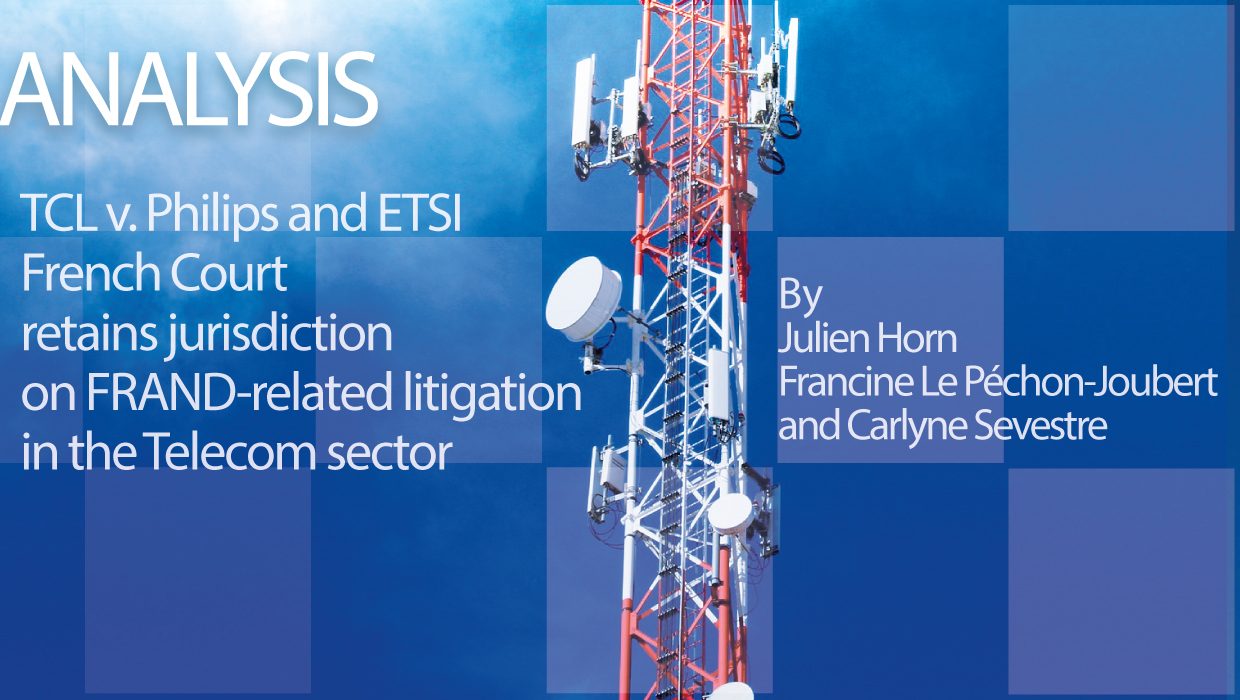
On February 6, 2020, the Civil Court of Paris (which has exclusive jurisdiction to rule on patent litigation in France) has issued an important decision (i) recognizing its jurisdiction to hear FRAND-related disputes involving ETSI and its IPR Rules and (ii) ruling that the undertaking of standard essential patent owners to grant FRAND licenses can be viewed as a “stipulation pour autrui”, a French civil law mechanism equivalent to a third-party beneficiary clause.
(i) Philips owns 2 standard essential patents (SEPs) which have been declared to the European Telecommunications Standards Institute (ETSI) based in France. Between 2015 and 2018, TCL and Philips unsuccessfully tried to agree on the terms and conditions of a FRAND license for both SEPs. In 2018, Philips filed a patent infringement lawsuit against TCL in the UK, seeking an injunction against TCL.
Then in 2019, TCL sued Philips and the ETSI before the Civil Court of Paris seeking a court order forcing Philips to grant a FRAND license on both SEPs and forcing ETSI to assist the parties with the grant of such license.
Philips requested the Civil Court of Paris to decline jurisdiction arguing that the UK court had already been requested to rule on the dispute between TCL and Philips and that there would be a risk of contradictory decisions if both the UK court and the French court were to rule on the same dispute.
In its February 6, 2020 decision, the Civil Court of Paris dismissed Philips’ request and retained jurisdiction to rule on all the claims made by TCL against Philips and ETSI. This ruling is based on Article 8.1 of EU Regulation 1215/2012 which allows the French court to retain jurisdiction against defendants domiciled in other EU Member States (the Netherlands as far as Philips is concerned) when one of the co-defendants is domiciled in France (which is the case for ETSI). The court found that there is a sufficient link between the claims made by TCL against Philips and ETSI despite the fact that both claims are based on different legal grounds: the membership agreement between ETSI and its members as far as TCL’s claims against ETSI are concerned; and Philips’ promise to grant a FRAND license to potential licensees as per ETSI’s IPR Rules as far as TCL’s claims against Philips are concerned. The French court also noted that both ETSI’s membership agreement and ETSI’s IPR Rules are governed by French law, which might have been another factor taken into account by the French court to retain jurisdiction on both claims and which might indicate that the Civil Court of Paris might be inclined to retain jurisdiction in future FRAND-related cases based on a potential breach of ETSI’s IPR Rules.
(ii) The Civil Court of Paris also said that the promise to grant a FRAND license to potential licensees made by the owners of SEPs as per Article 6.1 of the ETSI IPR Policy Rules could be qualified as a “stipulation pour autrui”, a French civil law mechanism equivalent to a third-party beneficiary clause that creates a direct contractual relationship between an ETSI member company (the owner of a SEP) and a third party (a potential licensee whether it is an ETSI member company or not).
It seems that this is the first time that a French court rules that the promise made by the owner of SEPs as per ETSI’s IPR Policy governed by French law constitutes a “stipulation pour autrui”.
Now that the Civil Court of Paris has retained jurisdiction over the entire dispute, the case will proceed and a judgment on the merits should be issued probably in 2021 on TCL’s claims against Philips and ETSI.
De Gaulle Fleurance & Associés is available to provide advice and recommendations on the consequences of this decision and on the “stipulation pour autrui” French law mechanism applied to FRAND-related disputes.
De Gaulle Fleurance annonce le lancement de SPATIO, un think tank dédié à l’industrie spatiale
A l’occasion d’un événement de place réunissant les acteurs du secteur (industriels, ...
Loi spatiale européenne : le pari ambitieux de la Commission
Tribune de Michel Matas et Laetitia Cesari dans Les Echos « Avec 70.000 salariés, 1...